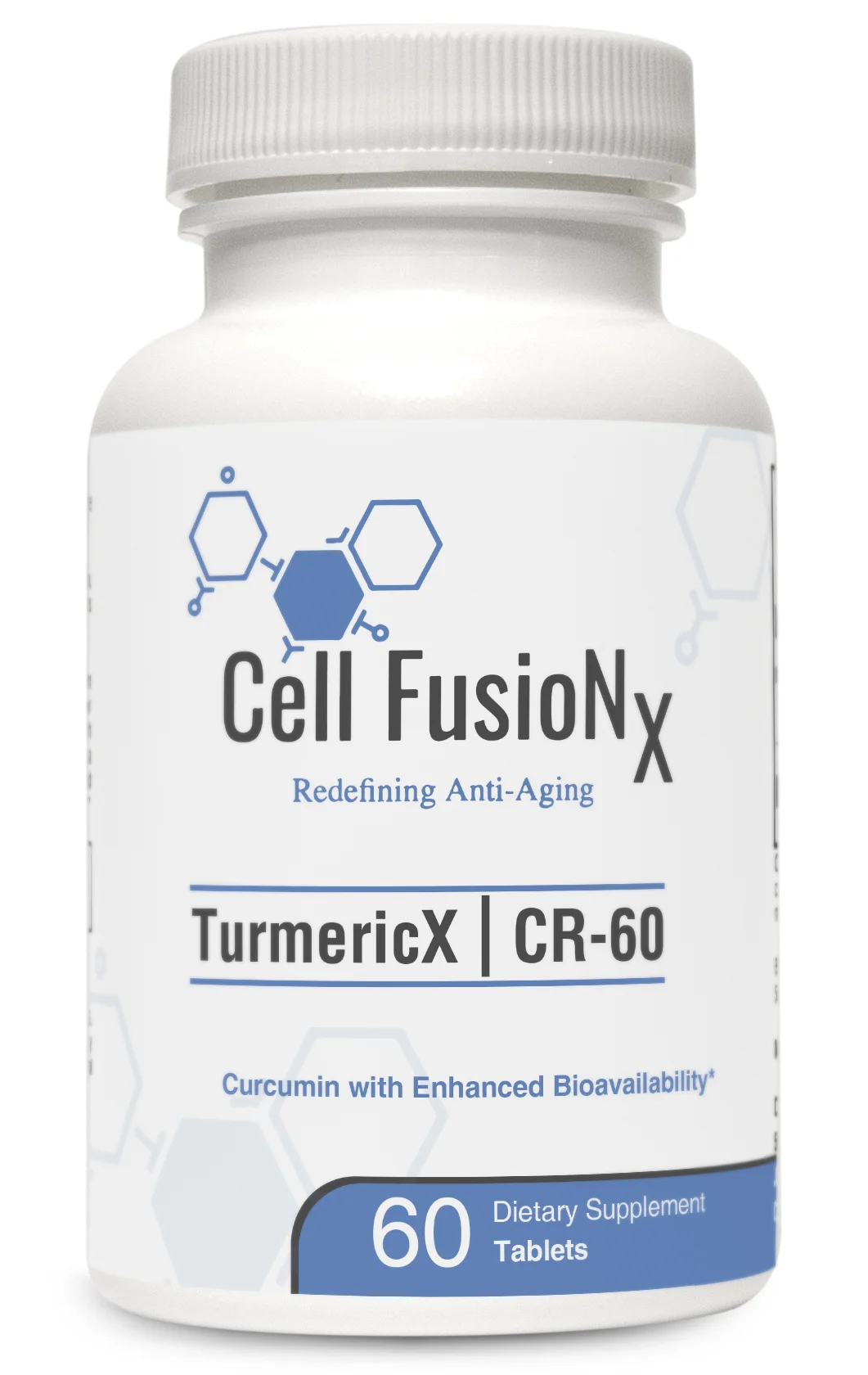TurmericX | CR-60
TurmericX | CR-60
Clinical Applications
• Supports Brain and Neuronal Health
• Supports a Normal Immune Response
• Provides Antioxidant and Cell-Protective Activity
• Supports Healthy Microbial Environment
TurmericX | CR-60 provides curcumin, a phenolic phytochemical obtained from turmeric (Curcuma longa). To significantly enhance curcumin’s naturally poor bioavailability, Cell FusioNX combined turmeric extract (95% curcuminoids) with BioPerine®, a patented black pepper extract and natural bio-enhancer, and added a time-release delivery method. The antioxidant, cell-protective, and immunomodulatory properties of curcumin have interested researchers for years.*
Discussion
The therapeutic effectiveness of curcumin is limited due to its poor absorption from the gastrointestinal (GI) tract, rapid
metabolism, and rapid systemic elimination. Instead of increasing the dose, TurmericX | CR-60 is formulated to increase the
amount of curcumin absorbed and bioavailable. It combines turmeric rhizome extract (95% curcuminoids) with BioPerine,
a patented extract of piperine from black pepper fruit. BioPerine has GRAS (generally recognized as safe) status and
is a clinically validated bio-absorption enhancer. It works by optimizing the body’s natural thermogenic activity, thereby
selectively providing a more efficient mode of nutrient transportation into the blood. Piperine improves the bioavailability of
curcumin both in preclinical studies and in studies on human volunteers. At a dose of 2 g curcumin alone, serum levels were
either undetectable or very low in human volunteers. But, curcumin administered with piperine produced much higher serum
concentrations from 0.25 – one hour after ingestion with a 2000% increase in bioavailability.[1] In animals, co-administration
with piperine significantly increased time to maximum serum concentration, while elimination half-life and clearance were
significantly decreased.*[1]
Combining BioPerine with curcumin results in significantly increased utilization of smaller quantities for optimal clinical
outcomes. But TurmericX | CR-60 doesn’t stop there. It also employs a patented, controlled-release delivery technology that
prolongs GI transit time and increases curcumin’s bioavailability up to 30% over standard delivery systems.
Curcumin is a phenolic phytochemical purified from turmeric (Curcuma longa)—an herb extensively used in both Chinese
and Ayurvedic herbology to relieve a variety of complaints. Historically, turmeric has been used for its effect on smooth
muscle function and its ability to improve digestion. More recently, the cell-protecting and immunomodulatory properties of
curcumin have become areas of great interest to the scientific community.
Immune Support and Antioxidant Activity Research has demonstrated that curcumin has antioxidant activity, is an
immune cell modulator, and has inhibitory effects on COX-2, iNOS enzymes, TNF-α, IL, and NF-ĸB[2,3], making it applicable
to a wide array of clinical presentations. Various animal and human studies support its use in promoting health in joints,
gastrointestinal mucosa, and the eye’s uveal tract.[2-8] Other research suggests curcumin may support balanced immune
response in the nervous, cardiovascular, GI, and respiratory systems.[2,3,9] Neurological tissue is particularly susceptible
to oxidative stress due to its high demand for oxygen, high levels of polyunsaturated fatty acids in neural membrane
phospholipids, and low antioxidant defenses.[10] Exciting new research in the field of brain and neurological health points to
the protective effects of curcumin.[10-12] Interest in curcumin in this regard is related to its oxidant/immune modulating activity
and positive effect on brain amyloid plaques.[10] Typical doses in human studies ranged from 375 mg -1,200 mg curcumin
per day.
Cell-Protective In animal models, curcumin has demonstrated desirable activity in promoting normal cell proliferation
in many, but not all, cell lines.[2,3] Mechanisms appear to include curcumin’s ability to modulate certain types of cytokines
(especially transcription factor NF-ĸB), support detoxification, scavenge free radicals, and to support induction of cell cycle
arrest and apoptosis.[2,3,13,14] Animal studies, and Phase I and Phase II clinical trials are encouraging; more clinical trials are
needed and underway.[2] Typical doses in human studies ranged from 450 mg – 3,600 mg curcumin per day for up to four
months.
Healthy Microbial Environment Curcumin has long been used to support a healthy microbial balance; this historical use
has been supported by more recent in vitro studies.*[2,3,15,16]


